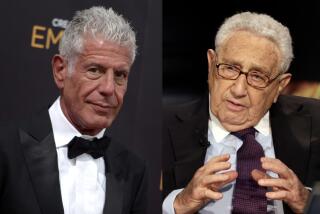Hussein’s Message to Americans
- Share via
In his article “Beware Timidity in the Endgame” (Commentary, Sept. 23), former Secretary of State Henry Kissinger leads a debate on policy objectives in the Persian Gulf which centers on events in the Vietnam War. And it is not hard to see that he has mostly accepted the critics’ view of history. “For economic and political reasons, I doubt a stalemate can be sustained.” The official military policy in Vietnam became defensive in 1970, under President Nixon. “A prolonged stalemate is likely to undermine the domestic stability of our Arab associates.” Does anybody remember Cambodia?
Is it realistic to assume that there is no debate on the gulf crisis because we continue to measure our foreign policy by events which took place during the Vietnam War? Would the U.S. be isolated in a “military crunch”? Should we place our head into the lion’s mouth again? Kissinger’s most revealing statement concerns an “imperative to create the right conditions for an equally rapid withdrawal.” And to that end I credit him with orchestrating the U.S. exodus from Vietnam, an event that could have been bloody and torturous, particularly in the final hours. We might not have such good grace in extricating ourselves from the gulf.
Kissinger has taken a good look at recent history and Vietnam when he calls for an outcome “more consistent with long-term stability.” By this I take it that he means a policy not formulated by the hawks who want to bomb Baghdad. Or is it Hanoi? It’s all too chillingly familiar to me, and quite probably to the former secretary.
DAVID C. REUTTER
Vista
More to Read
Get the L.A. Times Politics newsletter
Deeply reported insights into legislation, politics and policy from Sacramento, Washington and beyond. In your inbox twice per week.
You may occasionally receive promotional content from the Los Angeles Times.










